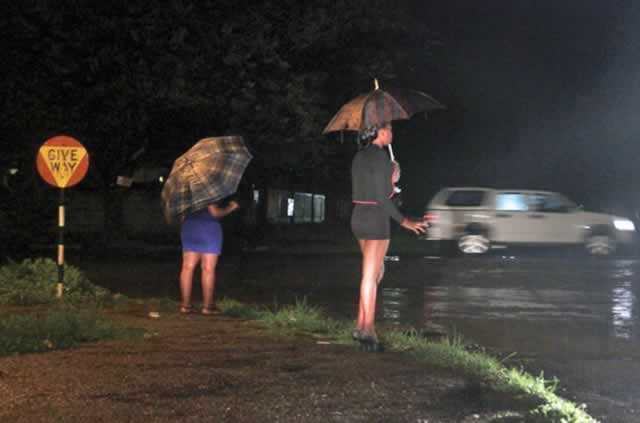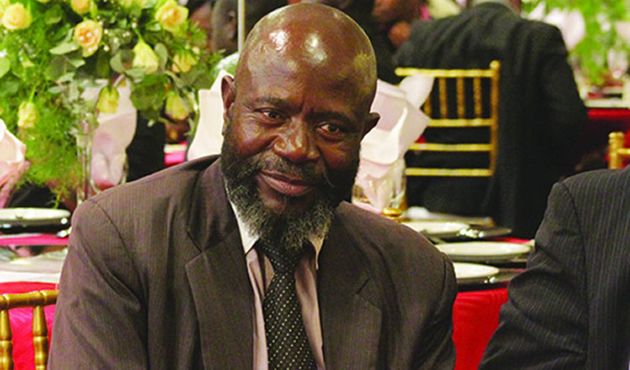Harare: Sex and the city

Sekai Nzenza On Wednesday
People said she drank in bars full of men and she walked the streets. Maybe she did not exactly walk the streets, kuita pfambi, because African women were not allowed in the streets of Salisbury in those old colonial days. Rhodesian police arrested them and ordered them to return to their villages.
It is after midnight in Harare’s beautiful tree-lined streets called the Avenues. Suddenly, a girl emerges from behind a big jacaranda tree. The car’s bright lights shine on her. She is wearing a skimpy red skirt, red high-heeled shoes and a small black top covering only half her breasts. She has a long wavy wig and red lipstick. It is windy and a little cold. It may rain soon.
With me is my cousin Reuben, the one who lives in Australia and my cousin Piri as usual. Next to Piri in the back seat is my brother Sidney. We are coming back from our Mainini Nemerai’s nyaradzo ceremony in the village. Forty days after someone dies, relatives and friends must gather together for a nyaradzo or memorial service to honour the departed.
I am driving because I can see the potholes better than Reuben at night. He is used to good Australian roads. Piri is still enjoying her beer even though it’s so late in the night.
When Reuben sees the girl, he quickly tells me to stop. And I do so, without really thinking. We all make eye contact with the girl. She is young and pretty, aged around 19 or maybe 21.
“Hesi, zvirikufaya ka?” Piri shouts, sarcastically telling or asking the girl if business is doing well.
Reuben politely asks the girl if she is alright. The girl smiles. Then she mumbles something and walks away.
“No deal for her,” says Piri. “I would rather starve than walk around like that. That girl should know that prostitution is illegal in Zimbabwe.” Then, as we drive along, Piri launches into this preaching sermon, saying the Bible says this and that about prostitution. “That young girl is a sinner. She will never see the gates of heaven. When I get home, I will show you Bible verses that say prostitution is bad,” says Piri, reaching for another bottle of beer from her small cooling bag.
“I can show you right now what the Bible says about prostitution. These days, information is on your finger tips,” says Reuben. He quickly pulls out his iPhone, one of his many gadgets. He googles the passages referring to prostitution. Imitating the voice of a big African American preacher, Reuben says, “In Proverbs 23 verses 27 to 28, it clearly says this: “For a prostitute is a deep pit and a wayward wife is a narrow well. Like a bandit she lies in wait, and multiplies the unfaithful among men.”
Reuben does not stop there. He continues to tell us that in the Gospel of John, Chapter 4, a Samaritan woman prostitute came to wash Jesus’ feet with her tears and dried them with her hair. Throughout the Bible, prostitution is seen as filthy and unholy and in some Biblical passages, God likens his people to prostitutes whenever they are unfaithful to him. In Ezekiel 23, God says Jerusalem and Samaria behaved like prostitutes or defiled women. It is written that Jerusalem behaved badly because “in her lust and prostitution she was more depraved than her sister (Samaria). She too lusted after the Assyrians . . . Then the Babylonians came to her, to the bed of love, and in their lust they defiled her. . . When she carried on her prostitution openly and exposed her nakedness, I turned away from her in disgust.” So says the Lord God Almighty! Alleluia!” Reuben lifts his hands in the air as if he is receiving the Holy Spirit.
“Amen brother, Amen!” shouts Piri.
“Shall I make a U-turn, go back to the poor young girl in the red miniskirt and ask her to come to the Lord?” I ask them.
But I am just joking.
“This business of prostitution is the oldest profession in the world,” says Sidney, who had been quiet all along. He then lists the number of women in our village who worked as prostitutes in Salisbury before independence. “They were the richest women around. And why go far? Our Tete VaDhaina, sister to Sekuru Dickson, was a prostitute.”
“That cannot be true,” Piri says.
“Before you use Biblical verses to judge other people, look at your own family. We are all beneficiaries of Tete VaDhaina’s work as a prostitute or pfambi, back in the early days when the Europeans were building Harare and the railway lines.”
I know the story of our great aunt Tete VaDhaina very well. She must have been born around early 1890’s before the Pioneer Column and Cecil John Rhodes took this country. VaDhaina married a man called Mudzimuirema. After just one child, VaDhaina’s uterus refused to give her any more children.
Mudzimuirema’s people said they wanted more children. Tete VaDhaina wore the sadness and shame of infertility. She came back to her maiden home and stayed in the village for a year or two. But nobody wanted to marry a woman whose uterus was dry. Then Tete VaDhaina moved to the city of Salisbury and lived in Highfield for many years.
Here, she was no longer bound by the rules or codes of behaviour of the village.
People said she drank in bars full of men and she walked the streets. Maybe she did not exactly walk the streets, kuita pfambi, because African women were not allowed in the streets of Salisbury in those old colonial days. Rhodesian police arrested them and ordered them to return to their villages.
But Tete VaDhaina managed to evade the laws. She came back to the village at Christmas and at Rhodes and Founders’ Day. Each time she came home, Tete was loaded with cash. She often bought two cows and a couple of goats.
Tete VaDhaina’s cattle could fill a whole kraal and her sheep numbered more than 15. She had many goats too. It required two herd boys to look after Tete’s livestock. At any given time, Tete VaDhaina’s cows provided milk for the whole village compound. Sekuru Dickson declared that Tete VaDhaina was a man because she had more wealth than anyone in the village.
By the time we were growing up in the village compound, Tete VaDhaina was already dead. My grandmother, Mbuya VaMandirowesa often reminded us that somewhere in our genes was the desire to become prostitutes.
We had inherited this desire from Tete VaDhaina. Mbuya said VaDhaina used to tell people that she was among the first black women to sleep with white men in Salisbury, as if that was something to boast about. Whenever Mbuya wanted to scold us, she said we should watch out for the shavi, or bad spirit that encouraged women to like men too much, the way Tete VaDhaina used to do. My grandfather, Sekuru Dickson would then jump to Tete VaDhaina’s defence because she was his sister. “And who is still enjoying Dhaina’s wealth? We all are. The kraal is still full of Dhaina’s cattle.”
“Oh God! Here we go. An old story of sex and the city!” says Reuben, closing his iPad and putting away his iPhone.
“Piri, you should stop judging these young women that you see walking the streets of Harare at night. If you look closely, there is always a story behind why women become a prostitutes. A woman does not simply wake up one morning and say, “Tonight, I shall become a prostitute,” said Sidney.
“Actually, the word prostitute is not a nice word,” says Reuben.
Then Sidney explains that in the Shona language, a prostitute is also called a “hure”, which is not Shona but corruption of the word whore.
The word only came into existence when Europeans brought it. Shona developed the word pfambi, meaning the woman who walks around.
“Overseas, these women are not called prostitutes any more. They are called commercial sex workers. Because this is a business,” says Reuben.
“God willing, this practice will end one day. There are better businesses than selling your body to whoever comes your way,” says Piri.
We let Piri preach some more. And I prayed silently, that Piri and no one else in my whole extended family, should follow in the footsteps of my great aunt, Tete VaDhaina.
But, if any of them do so, for whatever financial reason, maybe God will forgive them for feeding their families by practising one of the oldest professions in the world.
Dr Sekai Nzenza is an independent writer and cultural critic.










Comments